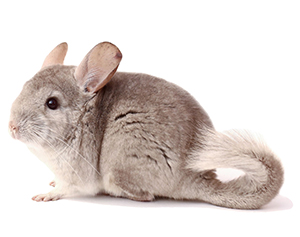Royal College of Surgeons Ireland evaded EU animal welfare rules with lethal experiments on chinchillas at American University
A Freedom of Information investigation by the Irish Anti-Vivisection Society (IAVS) has uncovered horrific experiments on an estimated 23 chinchillas commissioned by the Royal College of Surgeons Ireland (RCSI). Our exposé has gained national media coverage in the Irish Mirror.
The vivisection project, which broke animal welfare rules on multiple occasions, was intended to test a potential new treatment for chronic ear drum perforation (Tympanic Membrane Perforation (TMP)). The procedures, which took place in the spring and summer of 2021, were performed in the USA at the Medical College of Wisconsin (MCW) in Milwaukee.
Unlike Ireland and the EU, the USA has no independent government regulation of animal experimentation so there are no legal limits on animal cruelty. The IAVS is calling on the government to investigate the conduct of the RCSI and for Irish institutions to stop offshoring animal testing to countries with weaker regulation.
The chinchillas were subjected to multiple potentially fatal invasive surgeries on their head and both ears including:
- Inserting electrodes into the head to try to measure hearing capabilities while under anaesthesia (Auditory Brain Stem Response (ABR))
- Deliberate piercing of the eardrums in a crude attempt to mimic spontaneous ear drum perforation in humans (chronic TMP)
- Repeated application of substances to the damaged eardrums to prevent healing
Key findings:
- Two female chinchillas, 1252F and 1264F, died during the initial ABR test, probably due to mistakes in anaesthesia.
- In addition to the suffering caused by the ear drum perforation, many of the chinchillas suffered serious ear and eye infections due to the repeated surgeries, to the extent that the pain and distress caused head tilt in the animals. For example, on 30 June chinchilla 1259M was observed in a harrowing state: head tilt, right ear discharge, right eye closed with discharge, left ear whitish fluid; later that day he was noted to have an abscess in his right eye, expressing purulent material with moderate to severe ulceration, before being put down.
- Most of the creatures endured severe and prolonged pain, with eight out of 15 experiments persisting beyond the point where the animal was supposed to have been euthanised. For example, a female called 1268F was even found dead with rigour mortis, in contravention of both the RCSI’s own guidelines, that claim that animals should have 24hr supervision, and MCW’s own application which claimed staff would be on hand to provide out-of-hours care. She was also one of several animals who were not put down as required when they had lost 20% of their original bodyweight. Despite having breached that limit on 26 May, there were no further observations for three days until she was found dead on 29 May.
- The suffering repeatedly broke the internal rules set out by the MCW researchers. It also meant that the RCSI broke their own rules which say any animal research conducted outside the EU should still meet the requirements of Ireland/EU, which legally require animals to be euthanised once their suffering reaches a pre-determined level (known as a ‘humane endpoint’).
- MCW killed a minimum of 17 chinchillas in the actual experiments, two more than the tender’s estimate of 15, but only achieved a maximum of seven completed tests. In other words, the failure rate was 59%, double the predicted rate. In total, 23 animals had pain and suffering inflicted upon them for the sake of a failed study.
Given:
• the extreme severity of suffering
• the high failure rate leading to insufficient results
• ear drum perforation, though unpleasant, is not a life-threatening disease and treatments already exist
• the incompetence of the surgeons conducting the procedures
we believe that the project would not have passed the ethical evaluation harm-benefit assessment in Irish and EU legislation and therefore would not have been authorised.
To read a more detailed report on our investigation and to access the FoI documents, please visit our Chinchilla Campaign page here.


